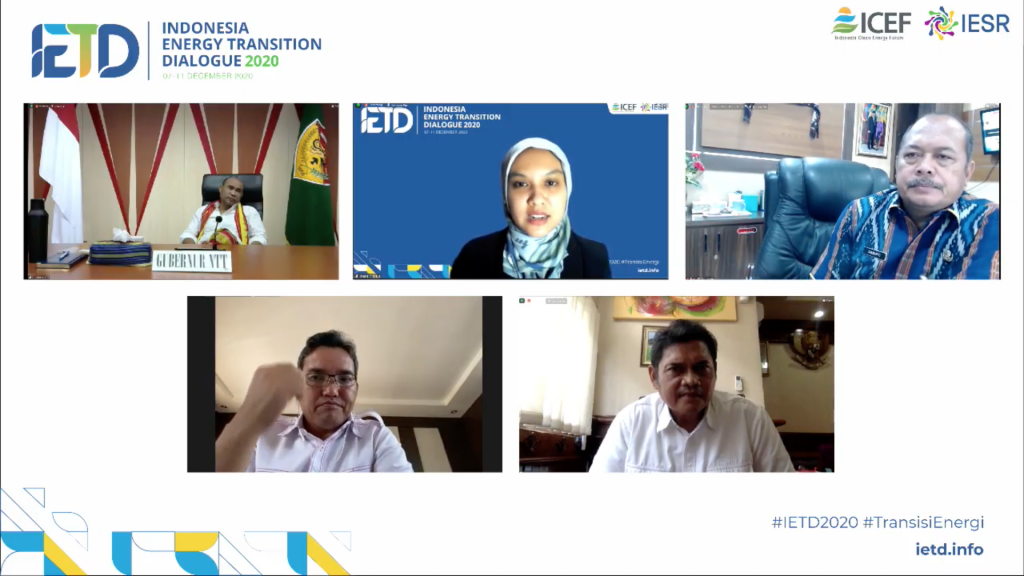Jakarta, December 8, 2020 – Each region in Indonesia has a lot of renewable energy potential that has not been utilized optimally. That being said, local governments with renewable energy acceleration programs are the key to the renewable energy transition.
Governor of East Nusa Tenggara (NTT), Viktor Bungtilu Laiskodat, said that NTT has 60,000 MW renewable energy potential from sunlight. However, only 100 MW of it has been utilized optimally by the people.
“In this transition, we face challenges from the local government, this is conflicting with the comfort of using fossil fuels, but we have no choice other than undergoing energy transition because the world’s interest is now heading there,” said Viktor, Tuesday (Dec 8, 2020) in a panel discussion on the Indonesia Energy Transition Dialogue (IETD) titled “High-Level Roundtable Dialogue: Local Governments Lead the Way in Energy Transition.”
Viktor said the companies that acquire seaweed from NTT start turning down products that are not produced using renewable energy. Based on this phenomenon, according to Viktor, a transition to renewable energy is inevitable. Therefore, the local government is still trying to increase renewable energy absorption from solar energy on Sumba Island.
However, according to the Head of the Energy and Mineral Resources (ESDM) in Central Java, Sujarwanto Dwiatmoko, local governments must also implore the community to adopt renewable energy potential. “If we only take into account the renewable energy absorption from power plants built by the government, the absorption target will never be achieved,” said Sujarwanto.
The Central Java Provincial Government has developed an Energy-Independent Village (Desa Mandiri Energi) in which the community uses solar power, hydropower, wind power, and livestock waste biogas as power plants. As of today, nearly 80 energy-independent Villages have been established.

Commitment between the local government and community has been implemented in Chungnam, South Korea. Chungnam Governor, Yang Seung Joo, along with 300 community organizations, has committed to eliminating carbon emissions by 90 million tonnes of carbon dioxide ever since his campaign in 2018. “Commitments from all stakeholders can accelerate the energy transition. The key is how local leaders can lead the transitional energy,” said Yang Seung Joo.
###
Tentang ICEF
Indonesia Clean Energy Forum adalah platform dialog konstruktif dan berbasis fakta untuk meningkatkan pemahaman transisi energi dan berbagi praktik terbaik mengenai kebijakan, peraturan, dan kerangka kerja kelembagaan untuk mendukung transisi energi yang adil di sektor energi Indonesia. ICEF secara resmi diluncurkan oleh Menteri Energi dan Sumber Daya Mineral pada 15 November 2018. Anggota inti ICEF terdiri dari 25 individu terkemuka dari berbagai latar belakang. Untuk informasi lebih lanjut silahkan kunjungi laman http://iesr.or.id/program/indonesia-clean-energy-forum/.
Tentang IESR
Institute for Essential Services Reform adalah institusi riset dan advokasi di bidang energi dan kebijakan lingkungan. Institusi kami mengkombinasikan studi mendalam, menganalisa kebijakan, regulasi, dan aspek tekno-ekonomi pada sektor energi dan lingkungan dengan aktivitas advokasi kepentingan umum yang kuat untuk mempengaruhi perubahan kebijakan pada skala Nasional, sub-bangsa dan dunia. Untuk Informasi lebih lanjut silahkan kunjungi laman www.iesr.or.id atau ikuti Facebook dan Twitter kami.
Media contacts:
Jannata Giwangkara
Manajer Program Transformasi Energi, IESR
081284873488 | egi@iesr.or.id
Gandabhaskara Saputra
Outreach and Engagement Adviser – Clean, Affordable and Secure Energy for Southeast Asia
IESR
081235563224 | ganda@iesr.or.id

